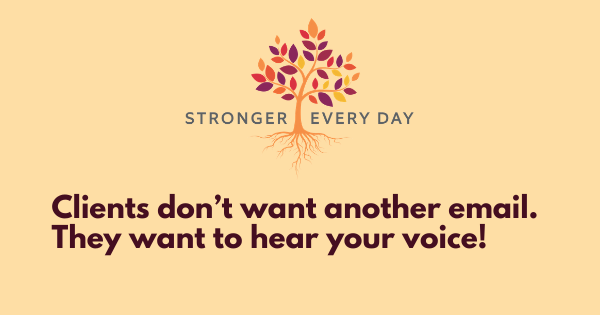I hope you are well. I hope your loved ones are well. And I hope your employees and clients are well.
Have you been proactively asking your clients how they are doing personally? Proactive communication has never been more important.
I recently spoke with an industry consultant who shared that many of her advisor clients proudly told her they had their clients ‘trained.’ She said the advisors told her that their clients know not to call when the markets sour because they know their advisor has it under control. When she told me this I gasped. If there ever was a correct time to be speaking personally to clients, it is right now!
A successful 2008 doesn’t give you a free pass
While you may have successfully navigated many of your clients through the 2008 market decline, it doesn’t give you a free pass on communication today. Consider that those you helped through the financial crisis are now 11 years older. They are closer to retirement or may already be drawing down their retirement portfolios. They are in a different space. And unfortunately, as we age we tend to get more nervous. Your clients want to hear your voice in this time. They want to know you care about what they are dealing with personally and secondly, financially.
This is all new to younger clients
Your 30- or 40-something clients may not have had meaningful portfolios in 2008. They may have only experienced investing in a bull market and don’t have a frame of reference for this volatility and downturn. If they had been investing for a first home or college tuition, they may feel their plans have been upended and could be wondering if they will be able to realize those dreams.
Now is the time to deepen relationships.
Now is the time to schedule a Skype call or Zoom meeting – not to send an email. Let your clients know you are concerned about them, their family and dreams.
- E-mail is not enough. While it’s okay to update via email messaging, it should not be your only mode of communication. Messaging in emails – especially when you’re working to get them out quickly – may become muddled. I’ve heard of advisors that have emailed and asked their clients not to call. The message that sends me is that it’s time to find a new advisor! Instead, message that you are working as quickly as possible to speak with each client personally and provide a time frame of when they might hear from you.
- These calls will be difficult. Putting these personal conversations off will only make them more difficult. Address the challenge and reach out to all of your clients – not just the large ones. Your clients will understand portfolio declines were not avoidable. What they won’t understand is why their financial coach didn’t care enough about them personally to proactively reach out.
When you talk to your clients – or see them in video chat – ask them first about their health and the health of their family. Give them the time and space to tell you how they are feeling. Then consider how you might help them personally.
For older clients:
Do your best to reassure and calm them and remind them of the importance of social distancing. Identify where they might need assistance and help where you can. Can you help them get set-up to order groceries online? Or, can you drop some off at their door?
For younger clients:
Remind them of the importance of social distancing. If they are anxious, do your best to calm them. Ask them how their children are doing with e-learning and how their parents/grandparents are doing. Suggest ways they can assist from a distance. Share insights you glean from talking with your other clients.
After covering the personal side, consider these topics
This is not the time to sugar coat anything. This is the time to build trust and credibility. It is the time to adjust and co-create a plan with your clients.
- The CARES Act. Make sure you’re educated on this so that you can be a resource for your clients. Understand what they are – or are not – eligible to receive. This is also an opportunity to engage with your clients’ adult children, to provide information on payments.
- Tax-Loss Harvesting. This may be a good time to take a close look at your clients’ taxable portfolios to see if there are any securities that make sense to sell. While you can’t predict the future, we hope that there will be gains in the market later this year to offset some losses.
- Retirement Planning. It’s probably a good idea to offer to take another look at retirement planning you’ve done for clients. If you think that the market downturn will restrict the timing of your client’s retirement, it’s best that they know that now to readjust their mindset. Conversely, there will be good news for some clients who are still on track.
- Budgeting. Your clients may have a new financial reality that calls for a new look at their spending. Discuss potential changes in their budget and counsel on which funds to use for liquidity needs.
For more timely insights, subscribe to The Flexible Advisor podcast series where we talk with industry experts and other advisors about how they are navigating in these uncharted waters.


